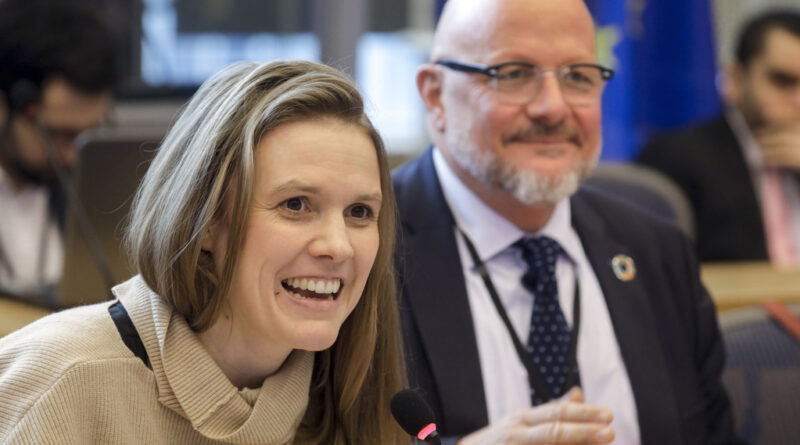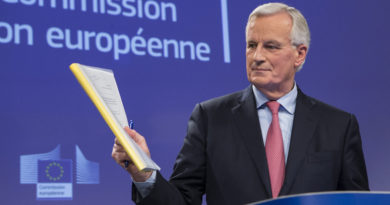Interview with MEP Terry Reintke: EU-UK friendship group and why Brits should participate in EU’s future debate
Even if the UK is no longer a member of the European Union, British citizens should participate in the Conference on the Future of Europe that will gather views on how to reform the EU, German MEP Terry Reintke has said.
The Conference, a Europe-wide consultation meant to last for two years, was due to be launched on May 9h (Europe Day), but it will probably be delayed due to the coronavirus crisis.
Meanwhile, a EU-UK friendship group was created at the European Parliament under the initiative of Ms Reintke. The idea came “the day after the UK election last December,” when Boris Johnson won with a large majority and “it became clear that Brexit would happen,” she said.
Ms Reintke, a member of the European Parliament elected with the German Greens, told Europe Street she has been “in love” with the UK since she lived in the country as a child. She then returned to study at the University of Edinburgh. It was only natural, therefore, that after Brexit she sought a way to keep communication channels open with former UK MEPs.
The EU-UK friendship group was created in that spirit. It also aims to offer British citizens and civil society the opportunity to remain in contact with the EU institution, Ms Reintke says. It is no coincidence that the first public meeting, on Tuesday 28 April, will focus on the “impact of Brexit on citizens’ rights in the UK and the EU”. The meeting will take place online due to the Covid-19 restrictions (registration here).
In this interview, Ms Reintke discusses the functioning of the friendship group, EU citizenship and the future of the EU.
How does the EU-UK friendship group work and who can be a member?
The EU-UK friendship group is open to MEPs and former MEPs who want to work on a future friendly relationship with the UK. So far it has about 100 members from the European People’s Party, the Socialists and Democrats, Renew Europe and the Greens. Members do not represent all EU member states yet, but that’s what we hope for. It is a platform to focus on three issues primarily: to ensure parliamentary links, with parliamentarians in the UK and other national parliaments, to discuss topics relevant for them; to be an entry point for citizens, especially for EU nationals in the UK and UK nationals in the EU, as their rights are at stake; to work closely with civil society organisations and pro-European movements in the UK, in order to continue cooperation.
This is a more informal group than the EU parliament’s coordination group on Brexit. The latter is made of representatives of political groups and parliament committees, and coordinates the work on the Brexit negotiations. It is where the political debate is taking place. The friendship group wants to ensure friendly relationships without pushing a political line. There may be disagreement among the political groups on certain issues, and that’s fine: that’s how democracy works. It is more an opportunity to network, but as we are active in our respective political groups, it allows us to take action elsewhere in the political arena.
The first public meeting of the friendship group will be on citizens’ rights. In your opinion, has this area been covered adequately in the Brexit negotiations?
The friendship group has already met several times, but this will be the first event open to the public. We will discuss safeguarding the citizens’ rights in the withdrawal agreement with three speakers from platforms of concerned citizens [including the3million and British in Europe]. The debate on citizens’ rights has been played very negatively in the Brexit negotiations. The European Parliament tried to safeguard them without much discussion, but there was no readiness for that in the UK parliament. What we have now is a basis for safeguarding the rights of EU nationals in the UK and Britons in the EU, but we have to look closely at what is happening in reality, listen to the concerns and enforce safeguards. In the UK, there is the issue of settled versus pre-settled status [different levels of protections are granted to EU citizens depending on their status] and there are issues about attitudes and belonging. But we also wanted to shine a light on the problems of UK citizens in the EU. We are in a good situation for that, as the friendship group includes representatives of parties in power in EU countries, so they can feedback to the respective governments.
What aspects of citizens’ rights will be discussed in the negotiations on the future EU-UK relationship?
Right now, under the circumstances we are in, I don’t see anything substantial about the future relationship that can be discussed by the end of the year and be sustainable for the future. My appeal is: please, please extend the deadline of the Brexit transition beyond 31 December. I say this constructively given the difficulties we face with the coronavirus crisis. Even Boris Johnson fell ill, so let’s focus on fighting the virus now and address negotiations later, and really put citizens’ rights at their core.
There have several attempts by British citizens to argue they should remain EU citizens. The latest legal challenge has just been launched at the Court of Justice of the European Union. Do you have any views on that?
I agree to explore that topic deeper, but to be absolutely honest, the priority so far has been safeguarding the citizens’ rights in the withdrawal agreement. There is no consensus on the idea of Associate EU Citizenship for British nationals [an option discussed at the European Parliament shortly after the Brexit referendum]. But I think we have to ask what are the different options, involve legal scholars in the debate, and assess pros and cons as part of the future relationship.
There are contradictions in the concept of EU citizenship, as it derives from national citizenship but is also a stand-alone principle. In the EU Treaty, this contradiction is not fully clarified. I am very pro-European, but I think what we need is to look at EU citizenship beyond Brexit and consider what it means for remaining EU citizens. This could be done in the context of the Conference on the Future of Europe. While this goes beyond Brexit, I hope UK citizens will be part of the discussion on the future of the EU. There has been such a broad debate about the EU in the UK over the past years that we should take it on board in the context of the Conference. We will certainly fight for the UK to get involved.
With Brexit and the Covid-19 crisis, EU citizenship has become more lively. We see citizens’ appeals for European unity in the response to the crisis, for example. But EU citizenship does not stand out as a topic in the Commission work programme, nor in the Conference on the Future of Europe. Are citizens more advanced on that thinking than politicians?
I would agree some of the political institutions of the EU are lagging behind. But I would defend the European Parliament, as it has always been at the forefront of the debate on EU citizenship and European democracy. We are now going to have a far-reaching debate on coronabonds, European solidarity, belonging and what the EU project means for citizens’ life. The problem is that national governments, including Germany’s, have been the opposite of visionary in this regard and have been blocking anything on this train of thought. But this crisis has so many implications for the economy and society that it will create more space for debate. I hope citizens will be engaged in this debate, like those who took to the streets after Brexit.
Do you think other countries will leave the EU?
I hope not, but I think Brexit has shown us that we can take nothing for granted.
What is your message to British citizens?
I repeat what I said in the last plenary session of the European Parliament with British MEPs. I really strongly believe one day UK MEPs will be elected at the European Parliament again.
Claudia Delpero © all rights reserved.
The transcript of the interview was adapted for publication.
Photo of Terry Reintke by Thierry Roge © European Union 2020 – Source : EP.
Europe Street News is an online magazine covering citizens’ rights in Europe. We are fully independent and we are committed to providing factual, accurate and reliable information. We believe citizens’ rights are at the core of democracy and information about these topics should be accessible to all. This is why our website and newsletter are available for free. Please consider making a contribution so we can continue and expand our coverage.





